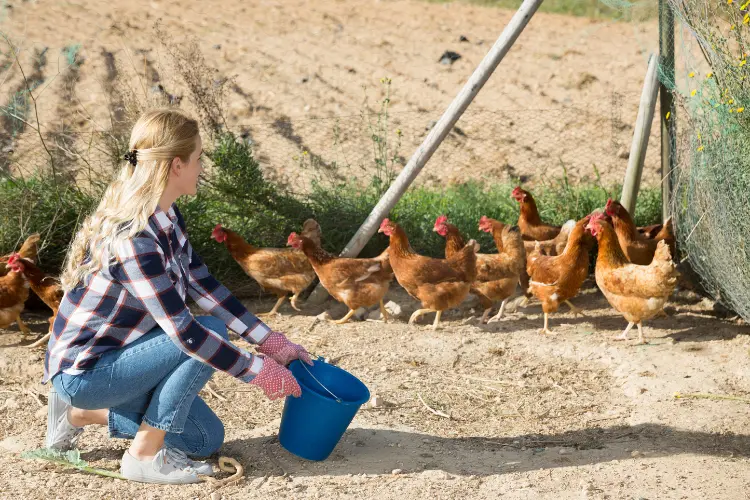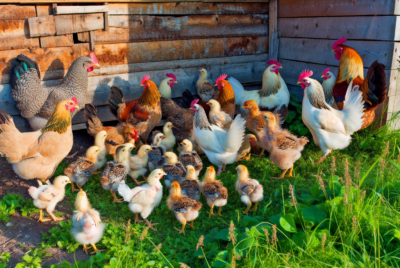What to Know Before Getting Chickens: An Essential Guide
Raising chickens in your backyard offers a unique blend of benefits, from farm-fresh eggs to delightful companionship. But are you prepared for the commitment and knowledge needed to take on this rewarding venture? So, I created this guide to provide you with what to know before getting chickens, like selecting the perfect breed, preparing a safe and comfortable coop, understanding your flock’s social dynamics, and more. So, let’s embark on this fascinating journey towards chicken-keeping success.
1. Understanding Chicken Commitment
Raising backyard chickens isn’t simply a hobby; it requires daily care, attention, and continuous learning to guarantee a thriving and joyful flock. Chickens, like any other living creatures, require proper maintenance and consideration. Factors such as noise levels and breed selection play a vital role in maintaining a steady supply of fresh eggs.
On a typical day, a chicken keeper’s tasks include keeping chickens healthy and happy by:
- Feeding and watering
- Showing regular care and attention
- Offering occasional treats and kitchen scraps
- Maintaining a clean coop
- Affording your birds some roaming time in a secure, enclosed yard
This applies to both adult chickens and baby chicks. The long-term commitment includes initial expenses for new chicks, ongoing costs, and the daily attention your flock requires.
2. Choosing the Right Breed for Your Needs
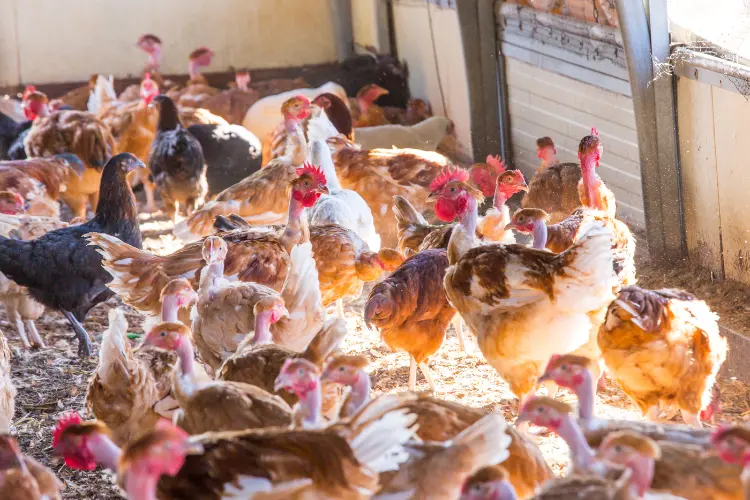
Choosing the appropriate chicken breed is a significant decision that can shape your overall backyard chicken-keeping experience. Several factors come into play, such as:
- available space
- climate
- egg production
- temperament of the breed
Beginner-friendly chicken breeds like Rhode Island Reds and Plymouth Rocks are great options for those starting their journey in backyard chicken keeping.
During breed selection, it’s important to investigate each breed’s needs, temperaments, and egg-laying behaviors. This will help you make an informed decision that aligns with your needs and expectations. Also, consider the potential risk of purchasing chicks that turn out to be roosters, as not all locales permit having roosters in backyard flocks.
The cost of chicks varies, which can help you determine how many chickens you can afford and how many eggs each to start with. Keep in mind that hens don’t lay eggs forever, and their egg production decreases with age, especially after the first two years. Knowing these factors will help you make the right breed choice for your flock. You can also read my beginner’s complete guide to selecting the best chickens for more information.
3. Preparing Your Chicken Coop and Run
A well-set chicken coop and run are vital for your flock’s safety, comfort, and overall welfare. Factors below play a significant role in providing a suitable environment for your chickens to thrive:
- Size
- Layout
- Ventilation
- Insulation
- Predator-proofing
Let’s delve into the specifics of readying your chicken coop, and your chicken run out. You can also read my step-by-step guide on how to build a chicken coop.
Coop Size and Layout
When designing your chicken coop, ensure to allot sufficient space for each bird. Each chicken should have 3 to 4 square feet of coop space to ensure their comfort and productivity until they stop laying eggs due to age. Overcrowding can lead to stress and disease, so it’s essential to avoid such situations.
Consider the future growth of your flock when purchasing or building a coop. I recommended acquiring a coop that can accommodate a greater number of chicks than what you initially plan to purchase. Also, make sure to provide the appropriate number of nesting boxes for your hens. For example, one nesting box is sufficient for 3 hens safe up to 4 hens.
Lastly, ensuring proper coop placement can provide shade for more chickens in the summer and a dry location in rainy climates.
Read also: What Should Be Inside a Chicken Coop Today – 10 Unseen Items
Ventilation and Insulation
Appropriate ventilation and insulation are vital to sustain a healthy environment for your chickens and shield them from severe temperatures. The most effective method for ventilating a chicken coop is to install adjustable flaps or sliding covers that can be opened and closed to regulate air flow. Be sure to create a draft-free environment by placing the ventilation above the chickens’ level.
In addition to ventilation, insulation is essential for keeping your flock comfortable in various weather conditions. Ensure the floor space and coop is well-insulated, use a fan for air circulation, and provide adequate shade in the summer. Contrary to popular belief, it is not necessary to heat the coop for your chickens in the winter.
Predator-Proofing Techniques
Shielding your flock from predators is paramount in backyard chicken keeping. Common predators include:
- Raccoons
- Foxes
- Skunks
- Hawks
- Coyotes
- Dogs
- Rats (with chicks)
To keep your chickens safe, employ predator-proofing techniques like secure latches, buried chicken wire, and hiding places.
In addition to physical barriers, be mindful of any pets belonging to your neighbors that may not be accustomed to chickens. Constructing a secure, enclosed area for your chickens to roam outside the coop can also help protect them from potential threats. Safeguarding your flock is essential for their well-being and for maintaining a continuous supply of delicious eggs. For a more comprehensive guide on how to build a safe chicken run, you can check our full guide.
4. Feeding and Nutrition Basics
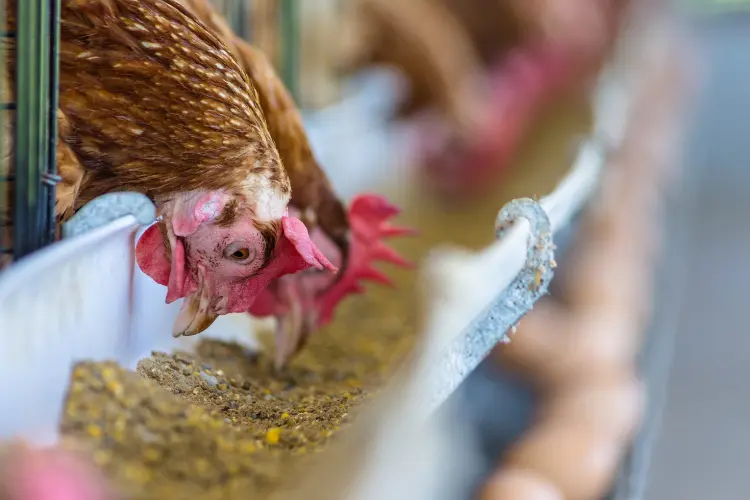
Feeding and nutrition are of great significance in maintaining a healthy flock. Proper nutrition includes types of feed, supplements, and providing fresh water and grit for digestion. Chicken feed is the primary expenditure when raising backyard chickens, with an estimated yearly cost of $50 per bird. Additional costs include bedding materials, water, and pest control.
Knowing which foods to shun when feeding your chickens is necessary. Do not feed them chocolate, avocado, or onions, as these can be toxic to your birds. Always ensure they have access to fresh water and grit for digestion.
A well-fed flock is the foundation of a successful backyard chicken-keeping experience, ensuring happy and healthy hens, especially when you raise chickens.
Read also: What Do Chickens Eat – 201 things on our list
5. Understanding Egg Production
Egg production in chickens fluctuates based on factors like breed, age, and season. Keep in mind that hens are most productive during their first two years, after which their egg-laying rate will decrease with age. It’s during this time that hens stop laying as frequently. Egg production also tends to decrease in winter months.
It’s normal to encounter imperfect eggs from your own flock of hens, as they may vary in shape, texture, size, and color. Be prepared for this natural variation and monitor your flock for any signs of feather loss, which can be attributed to illness, fear, or pest infestation.
Understanding your flock’s egg production patterns will help you get more eggs, better care for your birds and manage your expectations.
Read also: Proven Methods to Boost Egg Production in Your Coop
6. Health and Wellness Tips
Giving priority to your flock’s health and wellness is key to their welfare and productivity. By learning about common health issues, preventative care measures, and finding a chicken-savvy veterinarian, you can ensure your flock stays healthy and happy.
Common Health Issues
It’s important to be aware of common health issues that can affect your chickens, such as parasites, respiratory infections, and egg-laying problems. Regular monitoring of your flock can help you catch early signs of illness and address them promptly.
Parasites that commonly affect chickens include mites, lice, and worms, while respiratory infections like mycoplasma, infectious bronchitis, and avian influenza can also impact your flock. Egg-laying issues, such as egg binding, egg peritonitis, and egg yolk peritonitis, are other concerns to watch for. Being vigilant about your flock’s health can make a significant difference in their well-being.
Preventative Care
Incorporating preventative care measures is central to sustaining a healthy flock. Regular coop cleaning, proper nutrition, and parasite control are key aspects of preventative care. Effective biosecurity measures, such as maintaining coop cleanliness, implementing appropriate sanitation, and regularly cleaning equipment, can also help prevent the spread of diseases.
Sound feeding and nutrition practices are essential in preventing common diseases and parasites. In addition to these measures, regular health check-ups and routine treatments can assist in the identification and prevention of ailments. Prioritizing preventative care will contribute to a thriving and contented flock.
7. Finding a Chicken-Savvy Veterinarian
Finding a veterinarian well-versed with chickens is important before any health issues surface. You can find such veterinarians through online directories, recommendations from fellow chicken keepers, or by contacting local veterinary practices. Websites like poultrydvm.com and chickenvet.co.uk provide directories of veterinarians specializing in poultry care.
Joining online communities and forums dedicated to poultry husbandry can also help you find experienced veterinarians and offer valuable advice and support. When reaching out to local veterinary practices, inquire about their experience in treating chickens, as some general veterinarians may also have knowledge and experience with poultry.
By establishing a relationship with a chicken-savvy veterinarian, you’ll be better prepared to handle any health concerns that may arise in your flock.
8. Social Dynamics: Pecking Order and Roosters
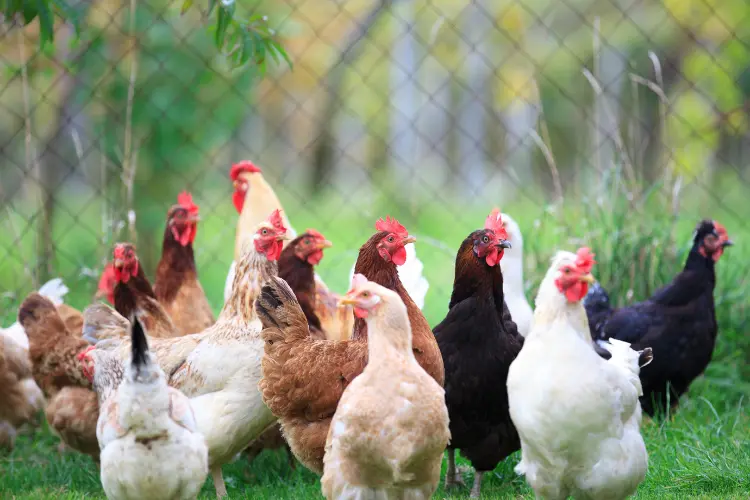
Comprehending the social dynamics of your flock is indispensable for preserving peace among your birds. The pecking order in chickens is a hierarchical structure within the flock that determines which individuals have access to the most desirable resources, such as food and sleeping spots. Being aware of this social structure can help you better manage your flock’s well-being.
Roosters can play a significant role in your flock, as they can guard the flock from potential predators and warn the hens of any dangers. However, roosters can also cause harm to humans and hens during mating. Consider the pros and cons of having a rooster in your flock, and be aware of local regulations that may restrict their ownership. Assessing the social dynamics of your flock, including the role of roosters, will help you make informed decisions about your flock’s composition.
Read also: Why Does the Rooster Crow in the Morning? An In-depth Look
9. Legal Considerations and Permits
Before you begin your backyard chicken-keeping journey, you must investigate local laws and regulations concerning chickens, including permits, coop placement, and limitations on the number of birds or roosters. Ensure compliance with legal regulations to avoid potential fines or conflicts with neighbors.
Some areas may require permits for chicken coops or limit the number of birds allowed, while others may only permit the raising of hens and not roosters. You should notify your neighbors of your intention to keep chickens, as they will produce some noise, especially after laying eggs.
By being aware of and adhering to local laws and ordinances, you can enjoy the benefits of backyard chicken keeping without legal complications.
10. Planning for Vacations and Absences

When arranging vacations or short absences, it’s crucial to make sure your flock receives proper care in your absence. Arrange for a pet sitter or neighbor to check on your chickens, provide food and water, and collect eggs during your absence.
Ensuring your chickens have enough food, water, and a clean coop while you’re away will help maintain their health and happiness. By planning for vacations and absences, you can enjoy your time away without worrying about the well-being of your flock.
Read also: How To Transport Chicken: The Best Travel Tips
11. The Emotional Rewards of Raising Chickens
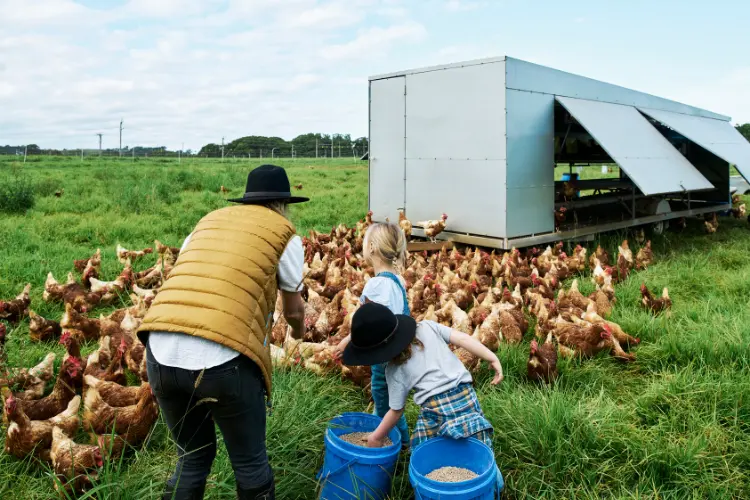
Raising backyard chickens offers emotional rewards that go beyond the production of fresh eggs. The companionship, amusement, and heightened understanding of one’s food source provide a unique and fulfilling experience.
Chickens can become cherished members of your family, providing laughter and joy in your daily life. While raising chickens comes with its challenges, the emotional benefits and deeper connection to your food source make the journey worthwhile. Prepare yourself for the joys and challenges of backyard chicken keeping and embrace the emotional rewards it has to offer.
Read also: The Mental Health Benefits of Raising Chickens
Conclusion
Before embarking on the rewarding chicken-keeping journey, you must have knowledge of what to know before getting chickens. This means understanding the responsibilities involved. Chickens, while delightful, require commitment. By researching and preparing in advance, you can ensure a harmonious and fruitful relationship with your feathered friends, resulting in benefits like fresh eggs and natural pest control. The key to successful chicken-keeping lies in informed and attentive care.

